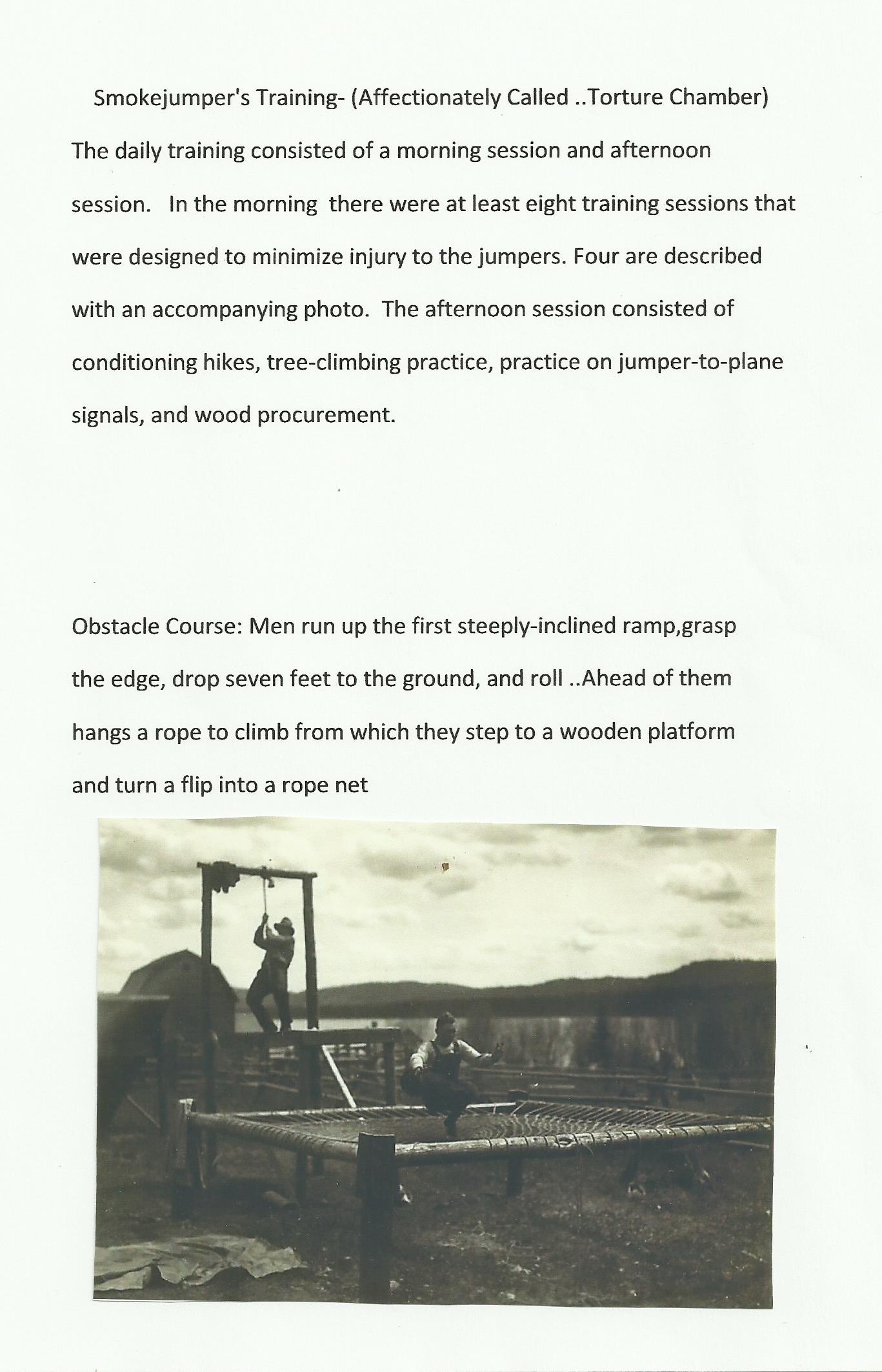
Allen decided to serve his country in a way that honored his religious convictions. He enlisted in the Civilian Public Service (CPS) in 1942. As a conscientous objector or CO, Allen risked derision, scorn and hatred by others. However, Allen was serious about his beliefs and wanted to serve the best that he could. "Probably some of the best and most positive times in Allen's life centered around his CPS experiences. Allen entered CPS Camp # 33 in Fort Collins, CO in the spring of 1942". (35) He enjoyed the Colorado mountains and scenery. Mary writes about a change in attitude that Allen had in regard to his service there as time went on. During the first year of CPS camp, he became upset and depressed about the lack of sincerity of many of the CPS'ers. He felt they were using their religion to escape military service and weren't serious in their opposition to violence. (36) He would later volunteer for the Smoke Jumpers, which was in its infancy at this time. It would provide more of a challenge and put him in a more isolated position.(37)

Roy Wenger, first director of the CPS Smokejumpers Camp wrote an article outlining the beginnings of the CPS involvement with the United States Forest Service. "USFS was about to enlarge its experimental smoke jumpers program from 21 to 60 men if an agreement could be reached. The agreement was signed, the request for volunteers went out to all CPS camps, 300 volunteered, 60 chosen and approved by both the church agencies and USFS, and training began at Seely Lake in April. It was a highly intelligent, well self-disciplined group, superior in mental and physical abilities and matched by the USFS training staff of like abilities. It was, in a sense a CPS camp direct- or's dream." (38) Ultimely, Allen and his fellow CPS'ers were instrumental in making the Smoke Jumpers the elite group it is today.
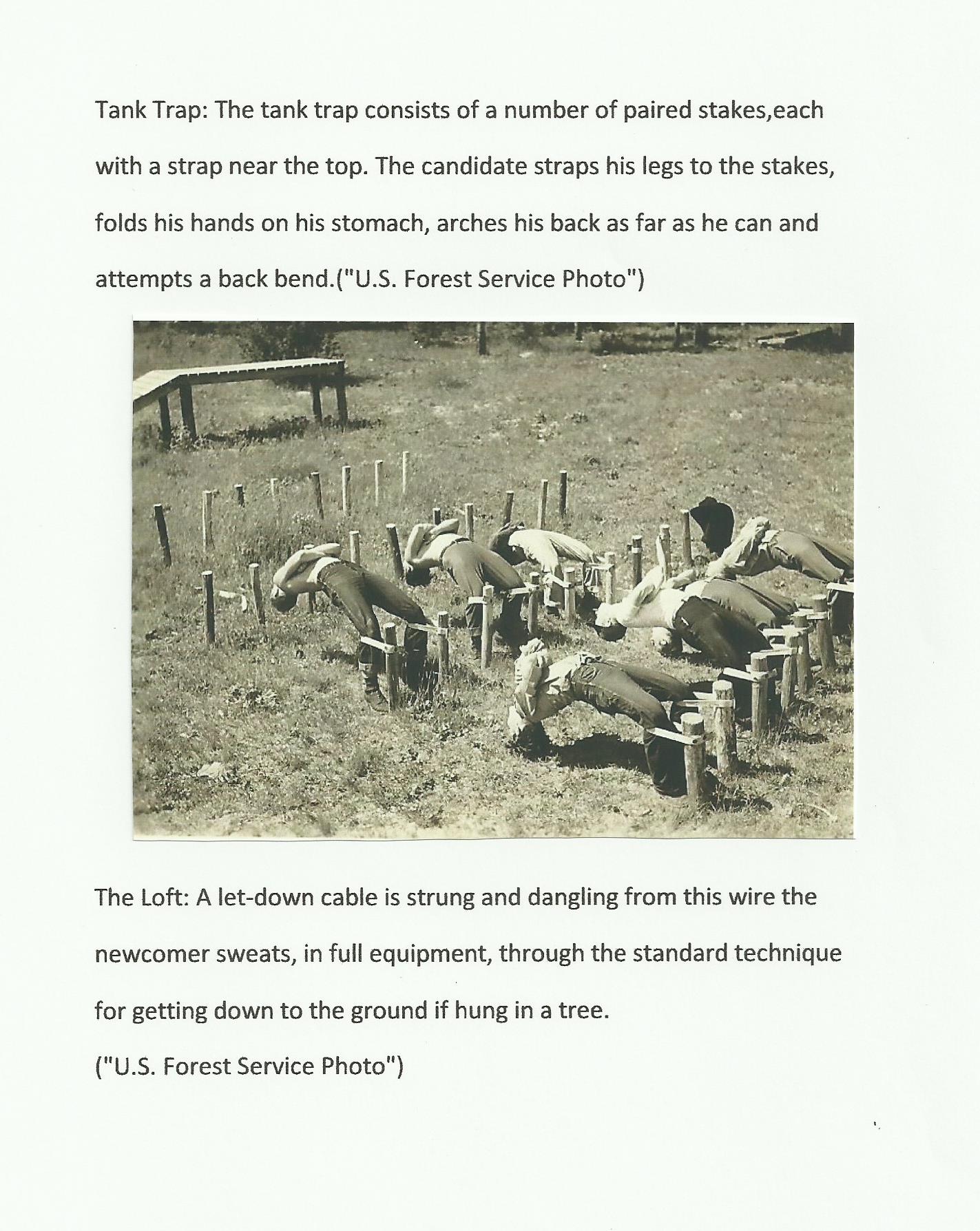
According to Wikipedia in October 16, 1940 there was no structure in place to handle thousands of anticipated conscientous objectors. President Franklin Roosevelt was not in favor of a program without military oversight, so a compromise was reached. Nearly 12,000 church affiliates made up the National Religious Conscientous Objectors, with the Mennonites being the largest group, and would serve as a liason between the churches and the federal government. The federal government spent $1.3 million for this program. The men performed $6 million in unpaid labor costs. The men served without wages and received minimal support from the federal government. The cost to maintain the camps came from the congregations and families. (39)
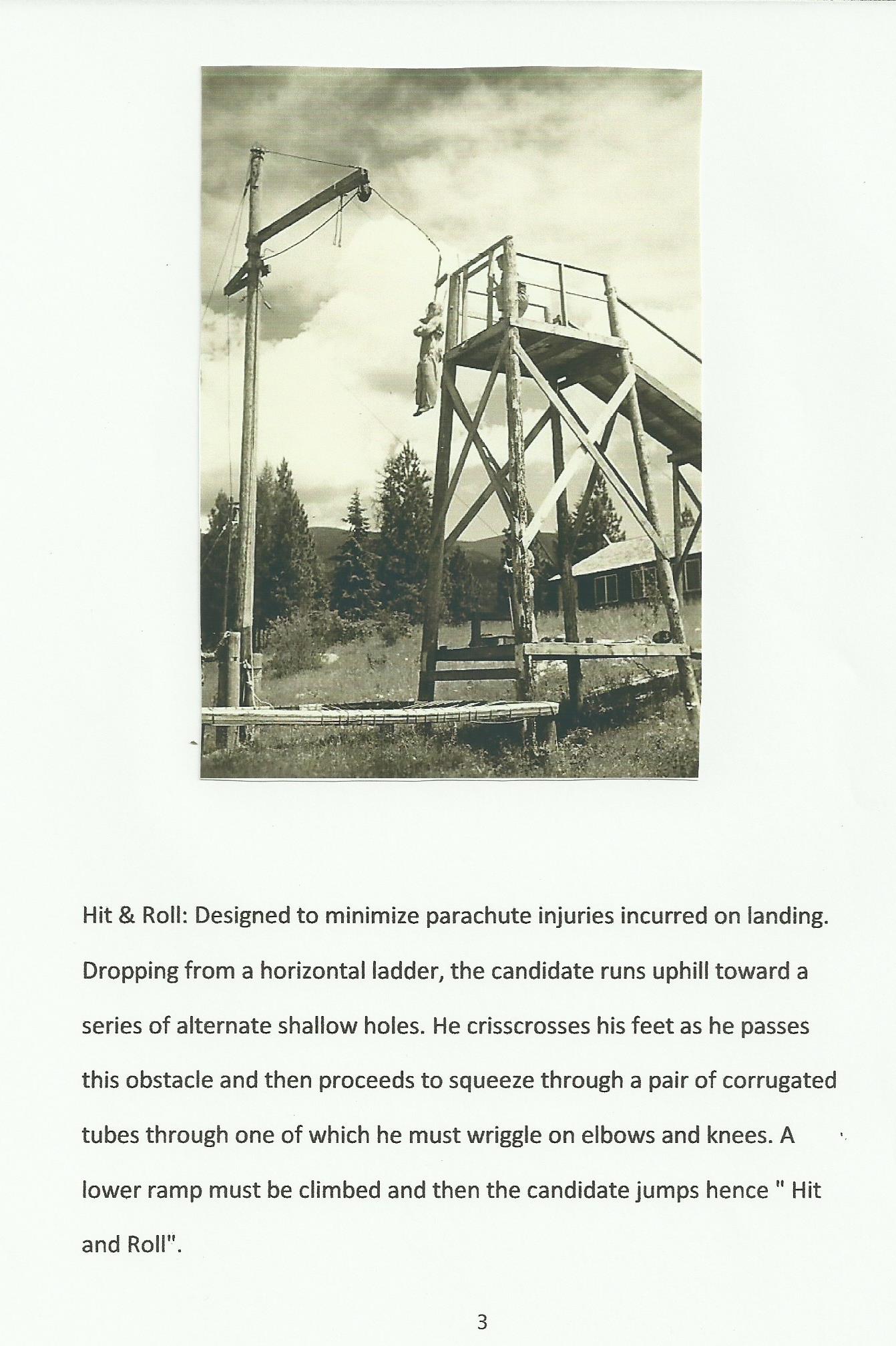
The men lived in barrack-style camps. The camps served as a base of operation from where the CPS'ers departed to do daily assignments. The men worked nine hours a day for six days a week. They received an allowance of between $2.50 and $5.00 a month for personal needs. The men earned two days of furlough for each month of service. These days could be saved to allow time to travel several miles from home base. (40)
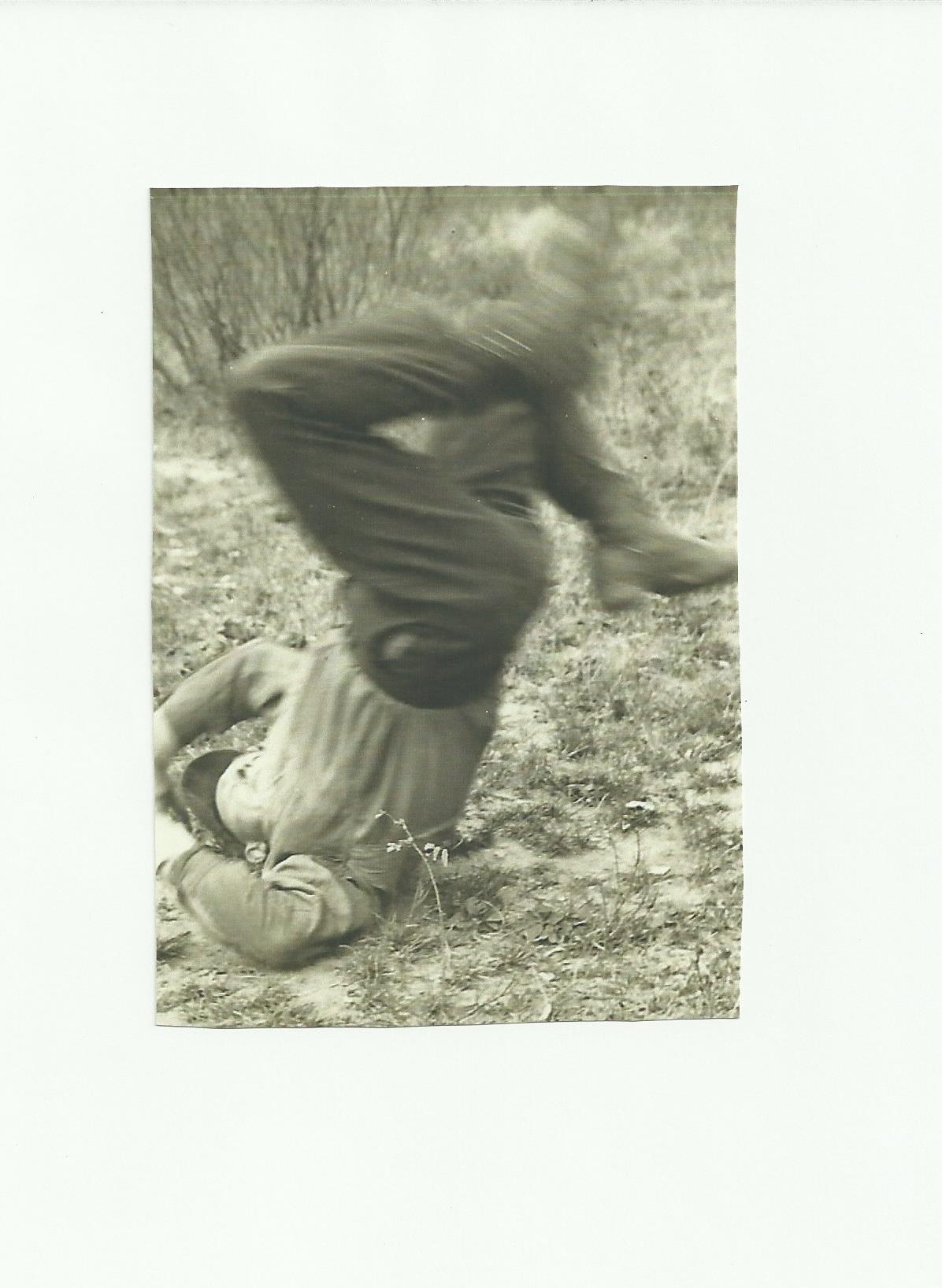
Allen enlisted in the Forest Service and National Park Division. He along with other members of the camp were responsible for fire control. Between fires they built forest trails, cared for nursery stock, planted thousands of seedlings, and engaged in pest control. (41) Letters written to family members would reveal day to day activities. He was seen as having great leadership skills by many of the men he worked with and even his superiors.
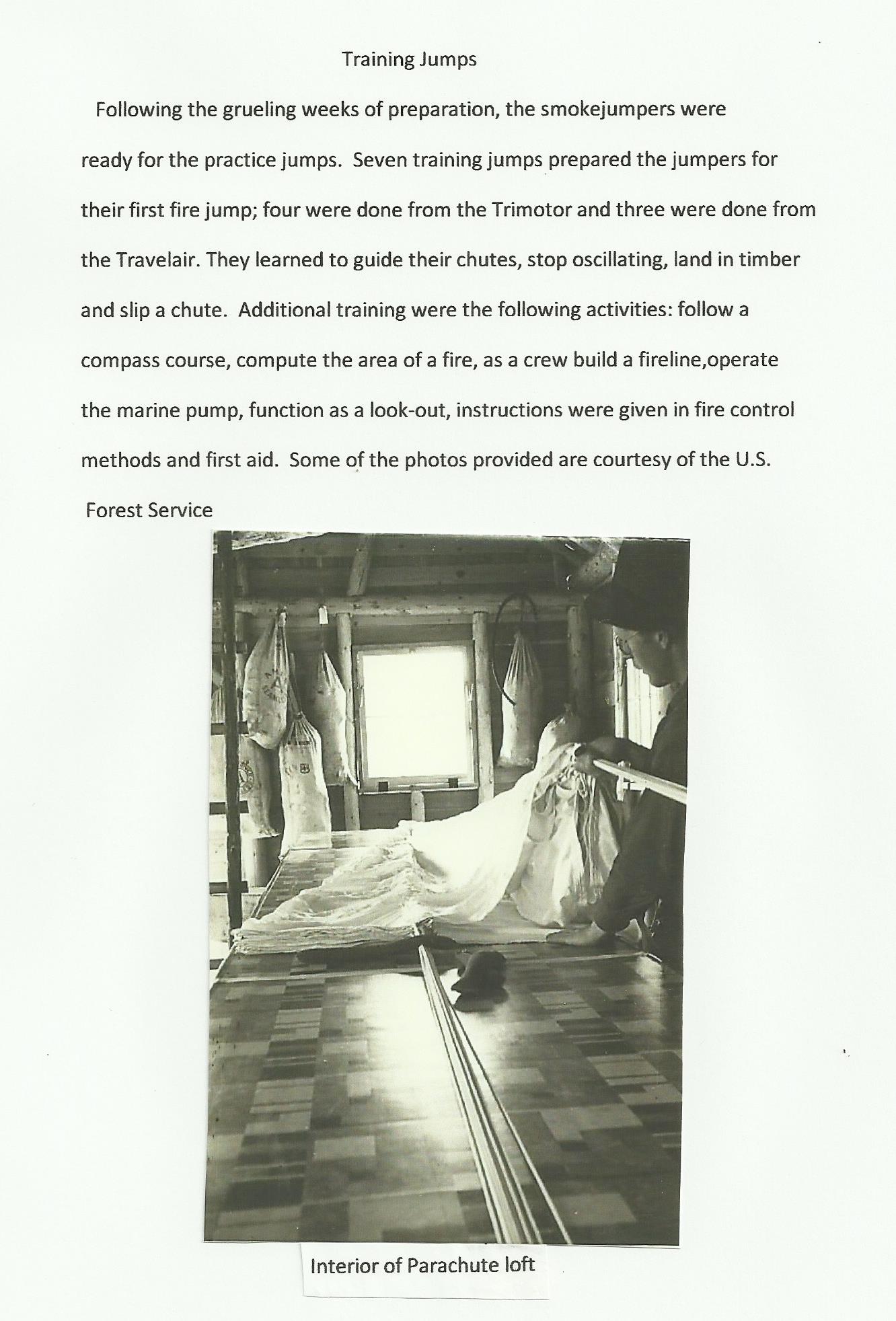
Allen made many good friends, during his time of service. One of his friends, Oliver Huset, and Allen were assigned as lookouts. Lookouts were usually housed in a two storied wooden structure atop a mountain for better viewing of forest fires. Life could be pretty isolated with few visitors. However, Allen and "Ollie" became fast friends. Although there was a four year age difference, the two men got along famously. Allen makes reference to Oliver in a letter written to his parents December 4, 1944, "Dear Folks, Well today Oliver is another year older, 23. Wed. is my turn and I really feel old. Gee Whiz 2 1/2 years in C.P.S. and prospects of that many more, Oh! well So Gehtz, I used to think when a guy got to be 27 he would get that middle age spread, well I am."(42) (Note: Gehtz is German for "so it goes") Oliver was a vegetarian and rather than let good meat go to waste, Allen would get a double meat ration, courtesy of Oliver! Many years following their service together, Oliver and his family would travel to Deer Creek for visits and an opportunity to stay in touch.
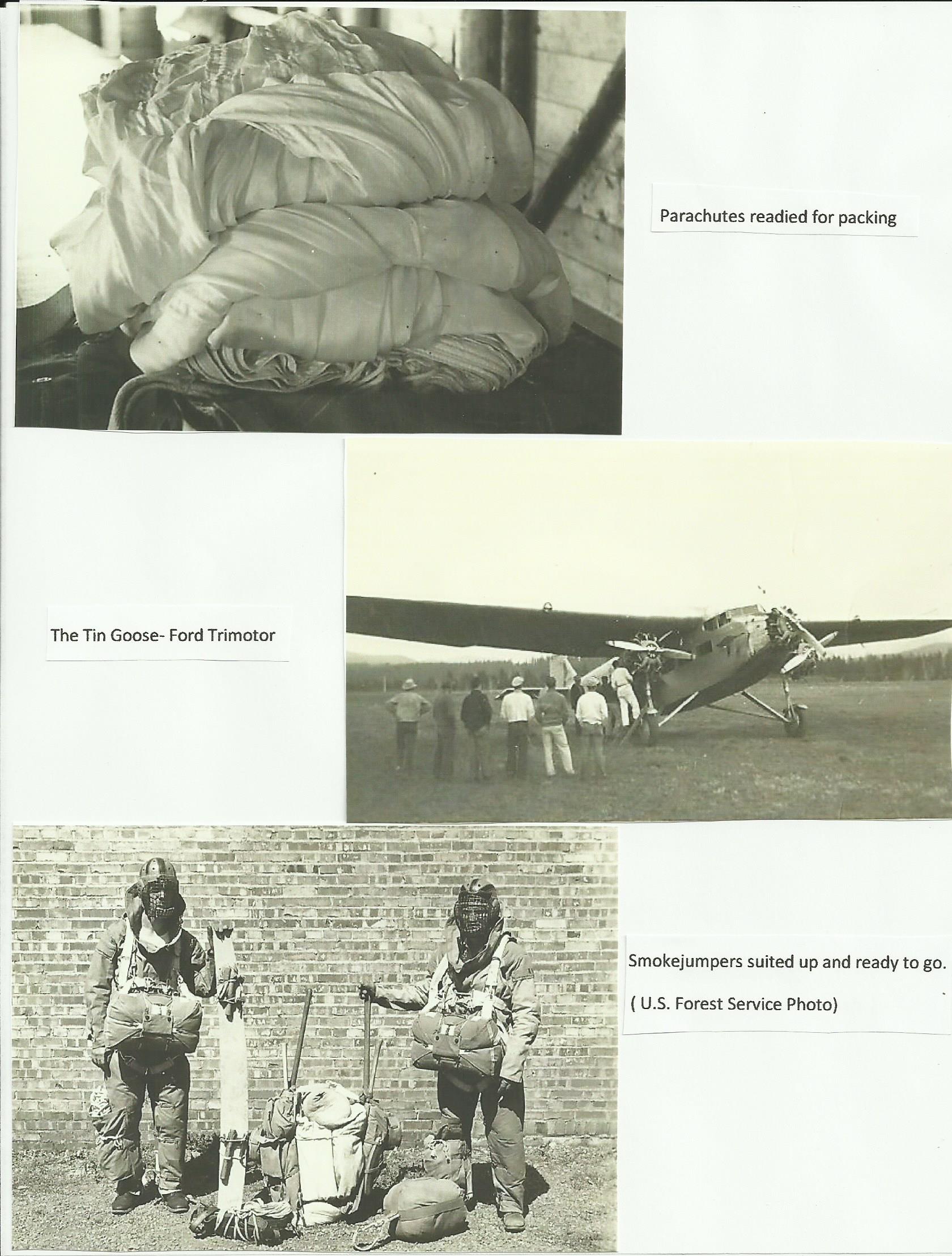
According to the National Smokejumpers Association, Oliver would go to become an engineer in his home state of North Dakota. He traveled and even worked a time in New York City, before coming back home to teach at the University of North Dakota. He passed away on March 27, 2004 (43) Allen is also listed in the National Smokejumpers Association database with the following information. "He was one of the few Civilian Public Service Smokejumpers to jump all three years the CPS jumpers handled operations out of Missoula."(44) As a smokejumper, Allen made at least 22 jumps.
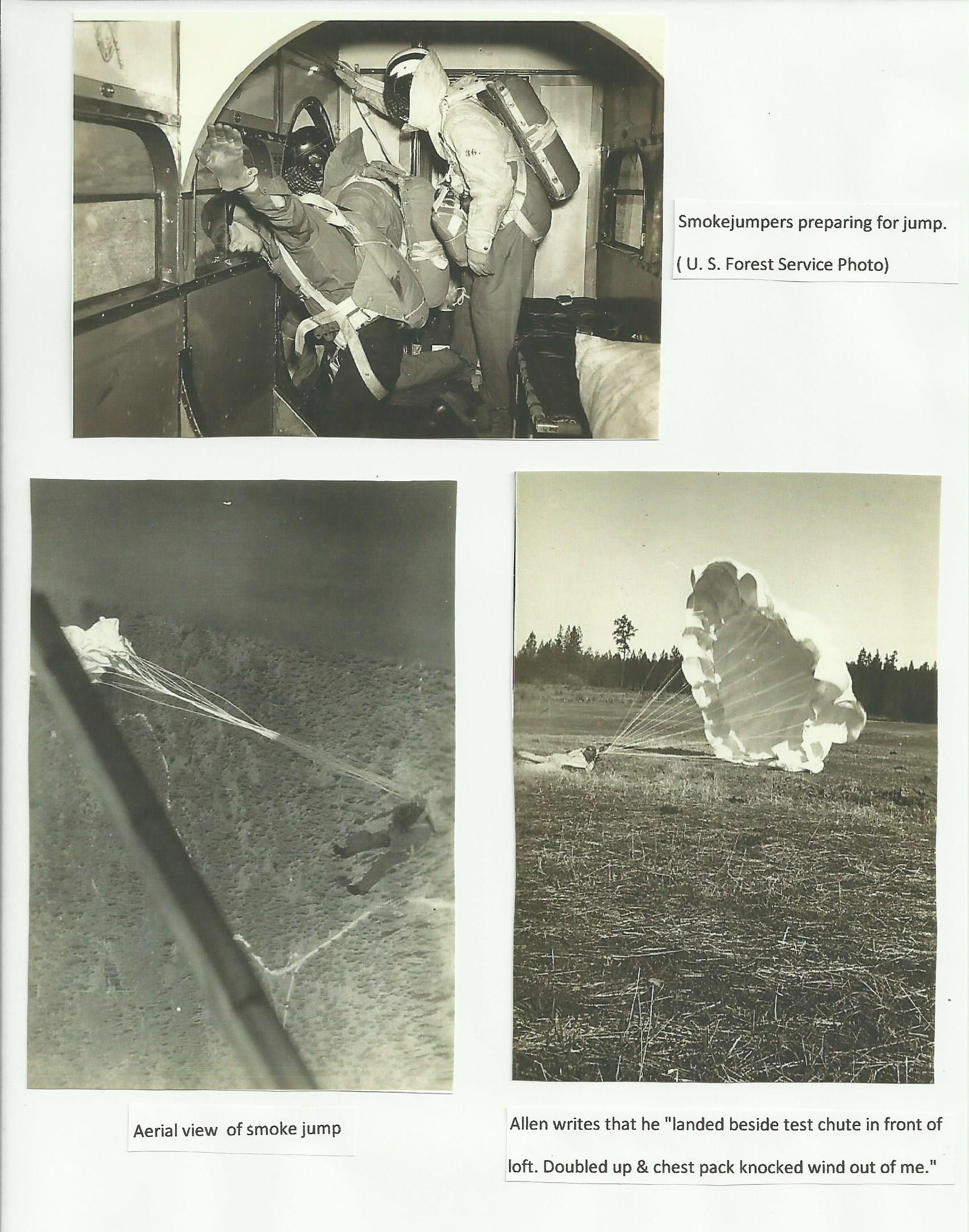
In many of Allen's letters he would insert reflections of current affairs, funny antedotes or jokes. The following is one such story. "An inmate in an asylum told one of the CPS men," I get $75 a month and they pay you $15 a month to watch me. Now tell me just who is crazy." He followed that story with a thoughtful insight from Mark Twain. "Mark Twain told of the definition of forgiveness volunteered by an inmate of an asylum: "Forgiveness is the fragrance the violet sheds on the heel that crushed it." (45)
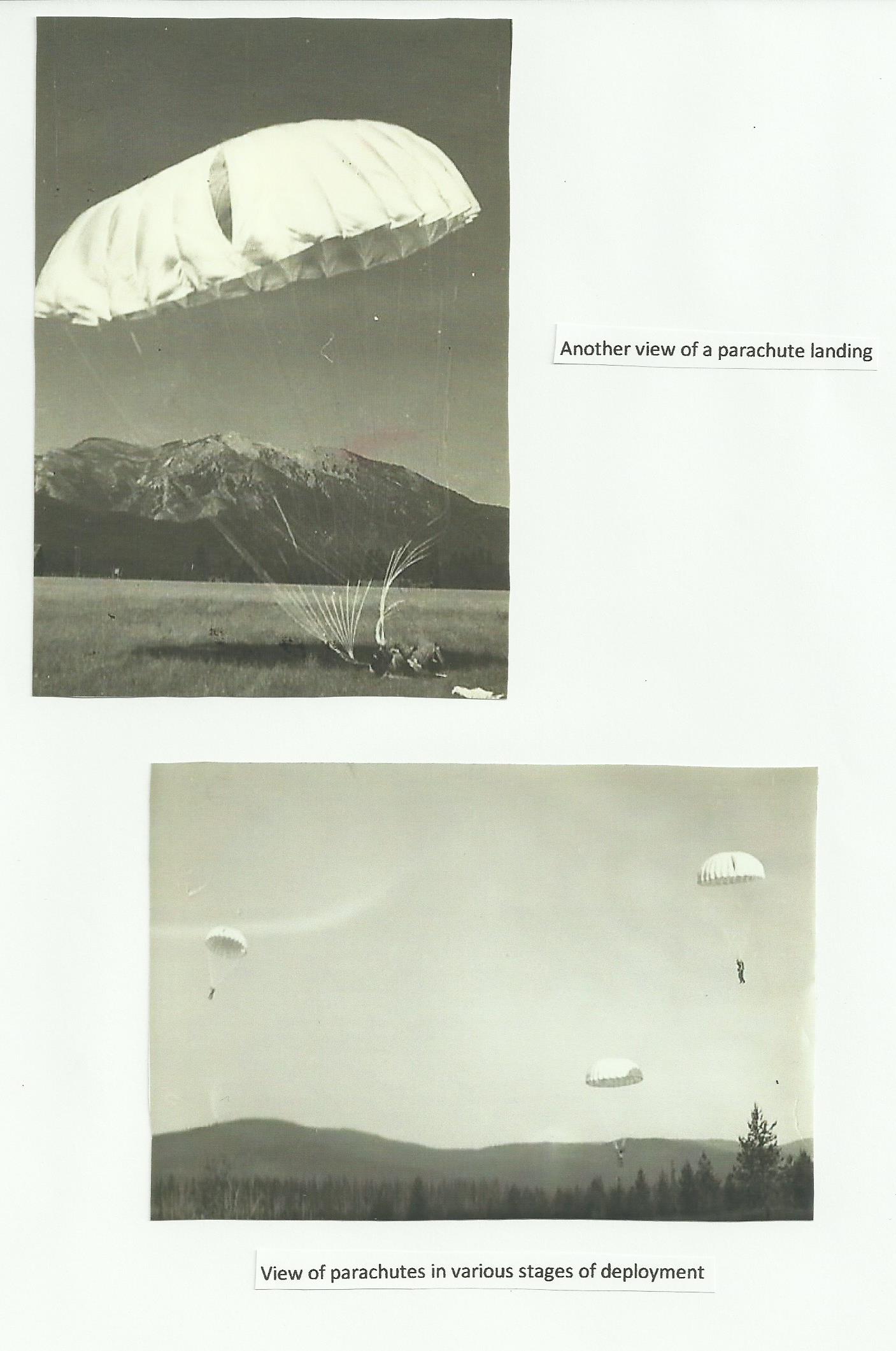
Hundreds of men volunteered for smokejumping, showing their willingness to take great personal risks. Smokejumpers were often placed in dangerous situations because when a fire was detected they were flown directly to the site and dropped by parachute to quickly contain and extinguish the fire. Allen writes about his first smokejumping experience to his family on stationary with the Smokejumper's letterhead and Camp 103 on the heading. It was entitled,"First Jump of '44 season." "On July 5, 1944 at 5:00 p.m. Morrell Mountain Lookout reported a smoke. The plane, Travelair, was ordered soon after and we ate supper at 5:30 as usual. At 6:00 Wag Dodge designated Paul Shrock and myself, Allen Moyer to jump. We loaded the equip- ment on the truck and took it to the landing strip where we suited up. The plane arrived at 6:50, we crawled in, loaded our fire packs and took off immediately. We flew over toward the base of Morrell Mountain and looked for smoke. The smoke was hugging the ground so we didn't spot it until we had flown over the area until 7:20. Shrock was the first to jump. He spotted for a small patch of short production. He landed on the edge, his chute hung up a tree about 30 feet. I jumped second and found that the new method of steering worked excellently. I turned my chute N.E. thinking the drift was toward the S.W. As I neared the treetops my chute turned wonderfully as I dodged several snags. About 80 feet up a cross drift hit me and started the chute oscillating. I slammed into a fir about 25 feet from the ground and on the back swing I hit the ground It was my first backward landing and was an easy one. My chute draped over about 25 lodge poles ranging in size from 8 to 15 feet. I jumped up and waved my streamer, then took off my equipment. The cargo was dropped 50 feet from my chute. Paul and I had our equipment together and chutes retrieved at 8:20 and in 10 minutes we found the fire, a large yellow pine snag. The fire was confined to the snag so we went to work with the crosscut saw and dropped the snag. We then used moist earth to cool off the hot areas and then knocked all hot charred pieces loose and mixed them thoroughly with earth. By 11:30 we had the fire out and the log trenched. We then crawled into our bags and fought mosquitos. The next morning we carried our equipment to the nearest trail. The packer picked it up and we walked to a road and came back to Seely Lake in a pickup in time for lunch." (46) From base camps scattered through the forests of Montan, Idaho, and Oregon men were flown as many as 200 miles to fire sites, carrying firefighting tools and 2 day supply of K-Rations. For larger fires additional men, supplies and food were airdropped to expand the effort. Up to 240 men served in this specialized program. One of the smokejumpimg schools was at Camp Paxton in Montana. (47)
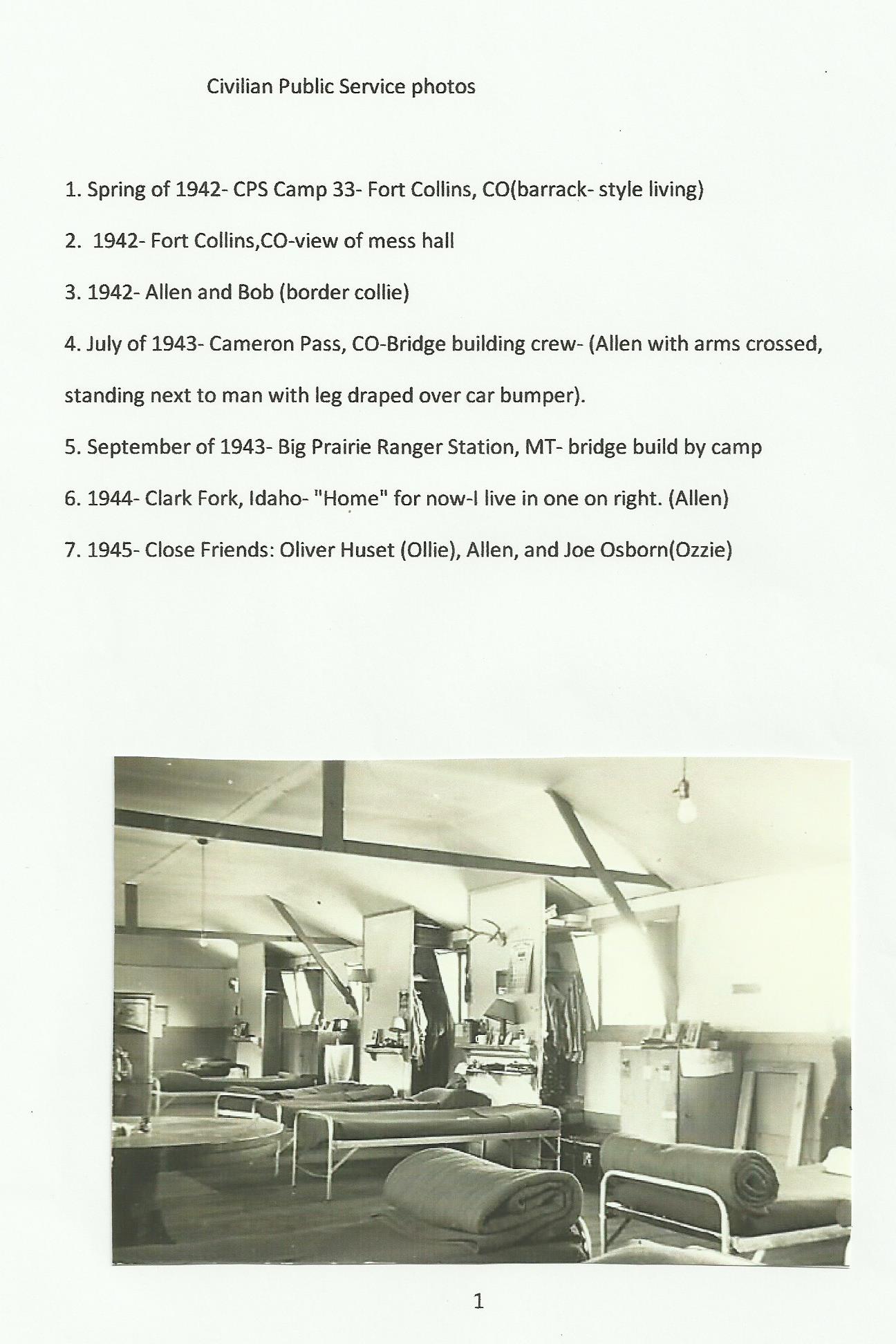
David Pittman, Allen's cousin, remembers a conversation he had with Allen." He told me once the loneliest he had ever been was one Christmas when he was walking down the street of some Montana town all by himself wishing he could come home." (48)
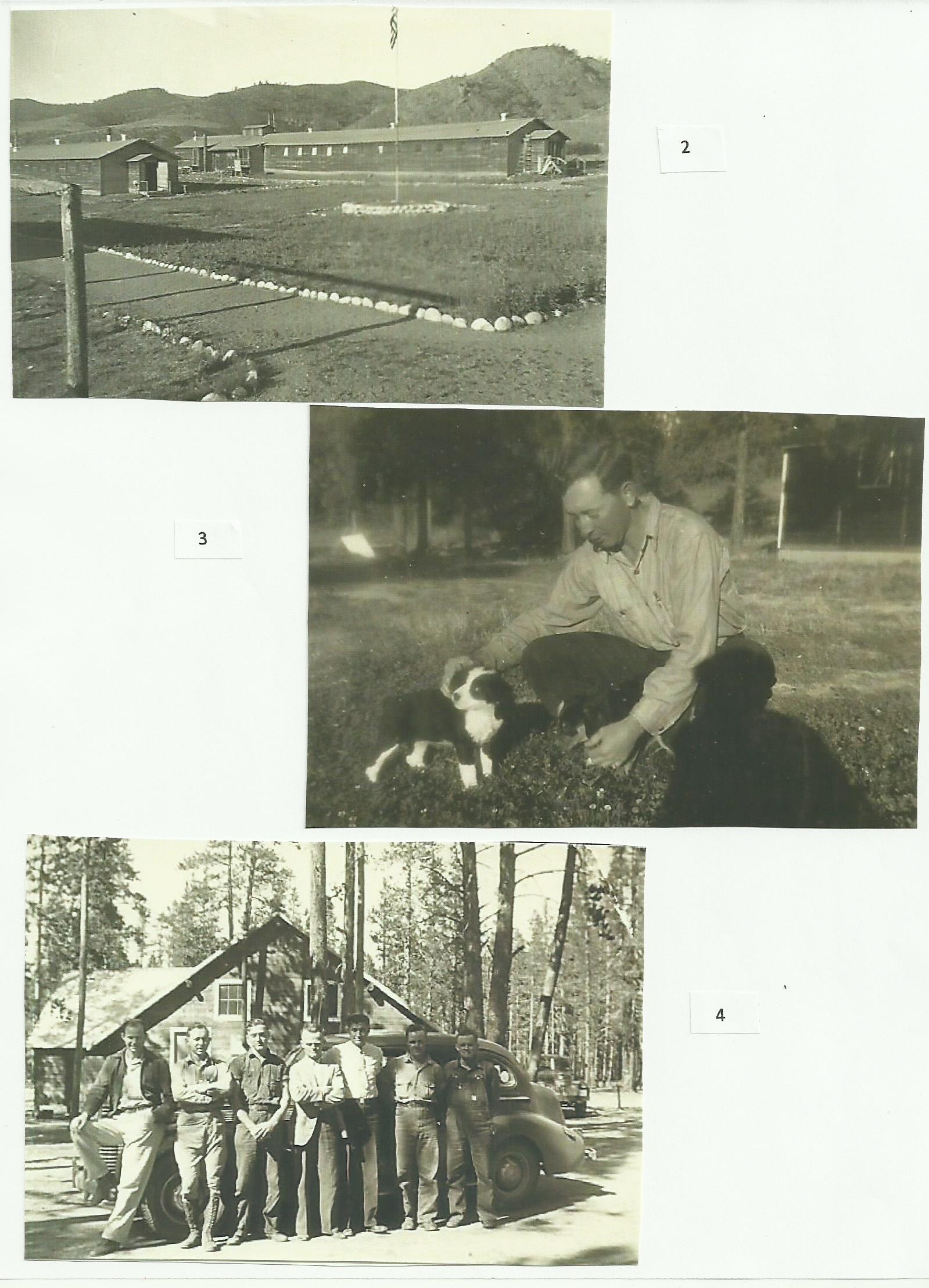
During March 1947, Civilian Public Service workers were officially released from their assignments and camps were closing. Allen writes to his parents about his pending dis- charge. The following is a hastily scrawled note dated March 4, 1946: " My discharge just came in at noon today. I am routed through Denver to Fort Worth, Texas and from there Medford on the Rock Island." (49) However, another letter dated May 18, 1946 would state that Allen was in Helena, Montana, still awaiting discharge from Civilian Public Service.
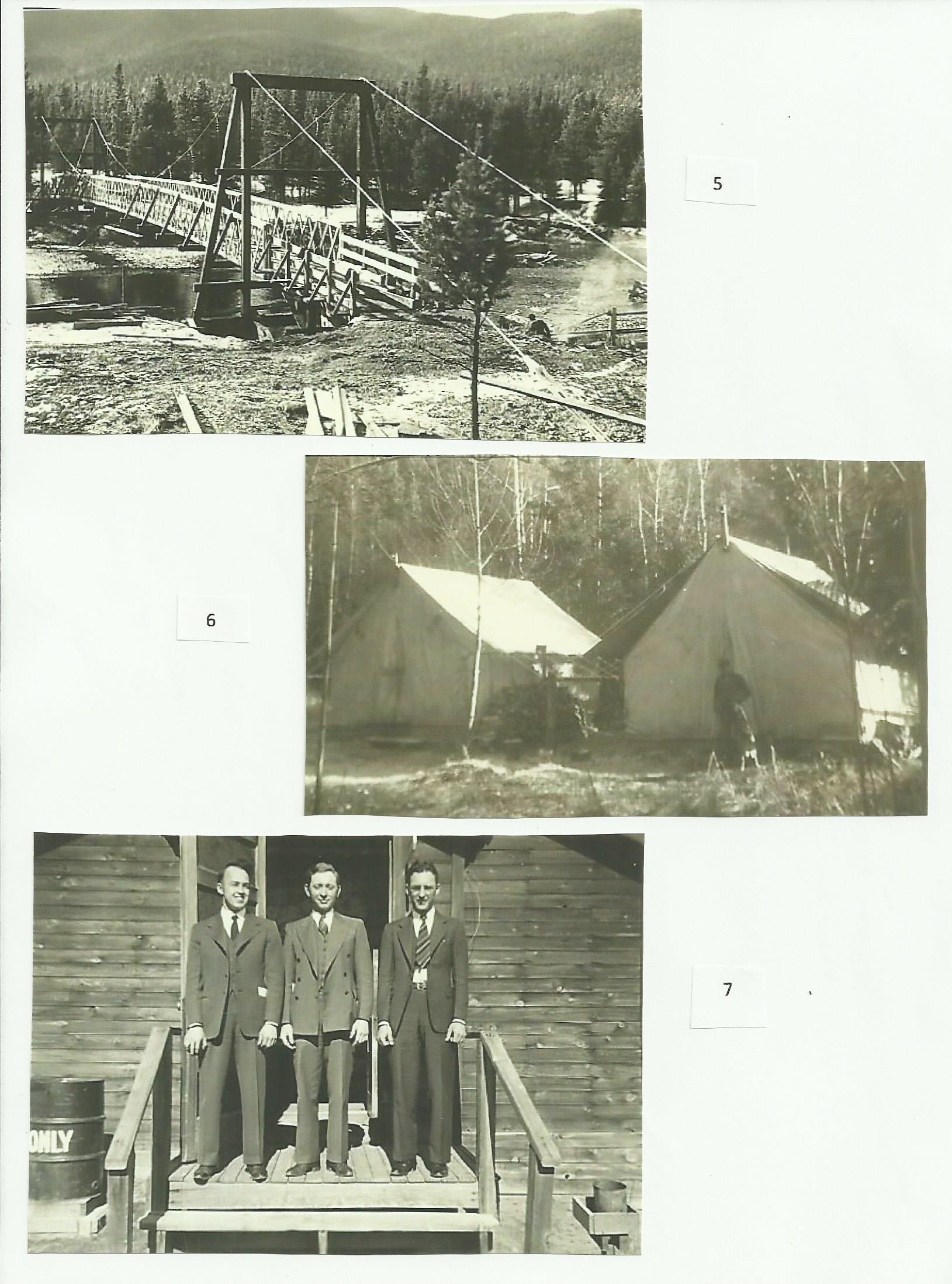
In reading Allen's letters home to his family, it became very evident that Allen had a variety of job experiences. Here are just a few gleaned from the letters: engineer, cook (in Allen's own words," a new low in my career"), chiropractor,supervisor,doctor, fore- man, truck driver,chauffer, mechanic, blacksmith, bridge builder, painter, road construc- tion job, telephone pole installer, patrol squad (fire spotter), bread baker and barber! (50)
After his release from CPS Allen would often provide transportation for his sister, Mary to bus stops, to Bethel College. Later, he made one mad dash to get Mary to Hutchinson Kansas, where she was teaching and living without a car to get her in time for her first date with Roland Duerksen. She writes that conversation was good during these trips, although he insisted that the only reason he made the trip to Hutch was that he was afraid she would be an old maid.(51) It was at this time that Allen would begin a new chapter in his life.
Copyright Rose Moyer, 2015, All rights reserved.